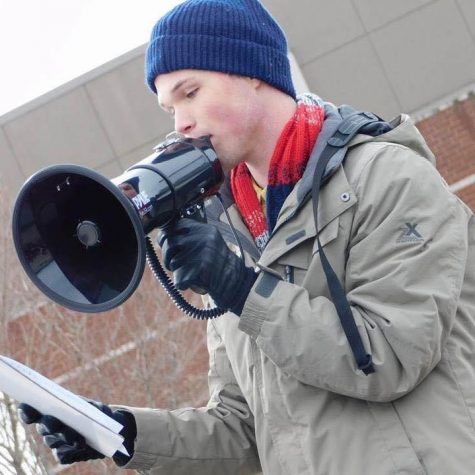Muskegon teen connects young adults to gun violence prevention resources
Sep 3, 2019
Amidst recent shootings in August, a student activist from Muskegon is connecting organizers to an upcoming summit hosted by Not My Generation. He described the organization’s mission as resourceful toward gun violence prevention.

“The summit, specifically, is about bringing a diverse group of individuals from across the U.S. to D.C. to pool resources within their regions,” Policy & Advocacy Manager Elijah Nichols said.
Nichols said that Not My Generation emerged in response to the 2018 Pittsburgh synagogue shooting. Executive director Kathryn Fleisher talked with others about the intersectionality of gun violence; the discussion entailed asking whether violence was based on race, religion or sexuality.
Upon hearing of Not My Generation’s call for a diverse coalition against gun violence, Nichols said it incited something within him. A major reason for his involvement goes back to Feb. 1, 2006, when his uncle, Frank Sibson, was shot and killed in Muskegon.
Losing an uncle made gun violence feel personal, Nichols said. Subsequently, he felt the need to take direct action upon such a systematic issue. When he speaks about gun violence prevention, Nichols thinks back to his uncle and how his family still hurts over the loss.
As the Policy & Advocacy Manager for Not My Generation, Nichols does not refer to the issue as “gun control.” He emphasized the term implies an authoritarian way of thinking, instead preferring “gun violence prevention” for its holistic approach.
Nichols works with regional coordinators, learning about communities’ needs and solutions for gun violence prevention. He asks organizers interested in attending the summit what resources they require. Upon arriving to the summit, Nichols said participants will receive informational packets, containing policy briefings by legislators to advocacy guides.
Such materials are normally available to experienced advocates and leaders in Washington, D.C., Nichols said. Not My Generation enables young adults to utilize resources they would otherwise lack access to. For example, advocacy guides will help organizers at the summit by instructing them on how to protest and lobby.
Meanwhile, applications to the summit involve building coalitions among people interested in attending it next November. When signing up as an individual, Nichols said this accounts for half of the application. He then connects individuals to organizers, and they form groups to finish the application and attend the summit together.
“Part of the reason that summits like Not My Generation are so important is because sometimes we can still have such a narrow view on the issue,” Michigan State University student Elizabeth Lancaster said.
As president of Students Against Gun Violence (SAGV), Lancaster said her group is focused on changing the university’s gun policy. Ordinance 18.01 states that no individual shall possess weapons at MSU, unless permitted by state law. Firearms Act 372 of 1927 specifies places that prohibit concealed weapons in Michigan, which includes schools, such as public universities.
However, Lancaster described MSU’s gun policy as confusing. Michigan law prohibits open carry of guns at public universities, with exceptions for security officers. By contrast, MSU allows visitors to open carry firearms, provided they have concealed pistol licenses.
While SAGV seeks to reduce school violence at MSU, Lancaster said her group is short on many perspectives on gun violence. She noted some students who attend MSU have probably experienced gun violence within neighborhoods and families. Furthermore, she said SAGV should acknowledge there will be new members who are not aware of community gun violence as a concept.
During the weekend of Aug. 3-4, CNN reported at least 31 people died during two mass shootings. El Paso, Texas had one shooting occur at a local Walmart; Dayton, Ohio saw another shooting in the Oregon District. For the El Paso shooting, CNN also reported U.S. Attorney John Bash said the Justice Department is contemplating pursuing hate crime charges.
On the same weekend, Lancaster and Nichols attended a Giffords Courage Fellow summit in Washington, D.C. One of the fellows was from Ohio while another came from Texas. After news arrived of the mass shootings, Lancaster recalled that silence accompanied lunch.
“We didn’t really know what to say because it’s really hard when you’re trying to do something that feels like there’s nothing you can do,” Lancaster said.
Despite the fact that shootings continue in the U.S., Lancaster said she is thinking about going to the summit. If she makes it there, she hopes to connect with organizers of clubs like SAGV.
For those interested in attending, she advised having an open mind and listening to other people. By doing so, Lancaster hopes making connections in the gun violence prevention movement will be easy.
As for Nichols, he noted that Not My Generation responded to the mass shootings with determination.
“Our response is always we stand with the communities that are affected by gun violence,” Nichols said.
























